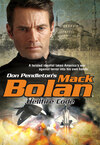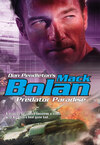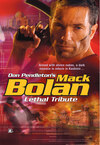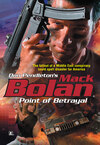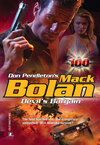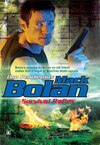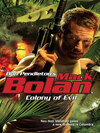Kitabı oku: «Hellfire Code», sayfa 2
And he planned to hold the first session of class in Atlanta.
CHAPTER TWO
Bolan’s flight touched down short of midnight.
Toting only a carry-on with two days’ change of clothes, Bolan bypassed baggage claim and headed straight to the underground parking garage where his car waited. Scrutinizing the garage a moment, he retrieved a special key from his pocket and used it to access the trunk. He traded his carry-on for a satchel there and the keys to the door and ignition, then climbed behind the wheel and exited the garage.
A light mist coated the windshield. Bolan maneuvered into the departure lanes with signs pointing the way to Interstate 85. Even at that hour, Hartsfield-Jackson Atlanta International wore its proud distinction as the busiest passenger airport in the world. Bolan took advantage of the logjam to open the satchel and retrieve a leather shoulder holster. At a red light, he slipped into the rigging and retrieved his Beretta 93-R, which had been wrapped in a thick silicon-coated cloth. After loading the Beretta with a 20-round clip of 135-grain Hi-Master rounds, Bolan nestled the pistol in the holster beneath his left arm.
Another ten minutes passed before he reached the highway and headed northeast. According to the dossier provided by Stony Man, Peter Hagen lived in the affluent suburb of Brookhaven. The Executioner wasn’t sure what to expect. Hagen might not have a clue about Downing’s current whereabouts, or even if Downing had continued to pursue the idea of his multiterrain vehicle.
Kurtzman had managed to pull some very basic schematics from data fragments within an obsolete NSA mainframe. The information proved fascinating and simultaneously puzzling. Bolan had never touted vast technical savvy, but one thing he did understand was the frightening prospect of a vehicle like that. In the hands of personnel trained to utilize it properly, such a dreadnought could prove a formidable opponent he wouldn’t be able to neutralize with mere small arms. The schematics alluded to twenty-six-inch homogenous armor, which belied a significant ability to withstand even heavier munitions.
Bolan could believe Downing would have credible reasons to pursue the construction of this vehicle. If Stony Man’s intelligence proved correct—and Bolan had learned long ago to trust it—Hagen was the kind of guy who could build it. Still, the lead wasn’t as solid as Bolan preferred.
Then again, he had other things to worry about. Like the twin set of headlights quickly moving up on his back end as he slowed to make the exit at Brookhaven. As the vehicle got within a few feet of his rear bumper, the driver switched to his high beams. The Executioner knew that trick, and he closed one eye so as not to be blinded by the bright-white glare in his rearview mirror.
Bolan would have chalked up the whole thing to an impatient motorist had it not been for the second vehicle that raced up the shoulder of the exit ramp into a parallel position. Unfortunately for this crew, the Executioner knew that trick. The driver would get his car just far enough past him and then veer into his path. An untrained driver would jam on the brakes, and the rear vehicle would contact the bumper and spin the target so that it left the ramp and crashed onto the highway below. Then the assailants would finish the job before the driver could recover.
The Executioner beat them to it.
Bolan increased speed, then turned the wheel hard right. The driver of the parallel vehicle stomped on his brakes and went the only place he could without ending up scrap metal below—to his left and directly into the path of his colleague’s vehicle. The second driver couldn’t stop his car in time and smashed into the swerving car’s rear driver’s-side door. The car spun as the one that struck it started to fishtail. Force of impact sent the first car skidding through the intersection at the top of the ramp. Its tires struck the sidewalk hard enough to flip the car onto its side. It slid into a telephone pole and ground to a halt.
The second vehicle, a late-model Buick, faired a little better. The driver managed to get it under control and bring it to a stop. For all the good it did him. Bolan was now EVA. He converged on the Buick with his Beretta 93-R in play. The driver saw him approaching and tried to open his door, but the impact had apparently wedged it shut. Three passengers bailed from the vehicle and reached for hardware, but Bolan already had them marked. He thumbed the fire selector switch to 3-shot mode as he targeted the closest enemy gunner and squeezed the trigger. The reports from the Beretta cracked sharply in the damp open air as all three rounds struck the man midtorso. The impact drove him backward into the rear seat.
Bolan grabbed what cover he could behind a metal light pole. The other pair returned fire, as eager to take him out. The Executioner had played the game more often, though, which proved unfortunate for his opposition. He waited for a lull in the fire, then sprinted directly toward the enemy gunners while they reloaded.
When the pair popped into view Bolan saw their eyes register surprise. He was now virtually on top of them. The Executioner squeezed the trigger once more, blowing off the better part of one man’s face. The remaining enemy gunman tried to draw a bead on Bolan, but his fumbling move was almost comical. The man’s shots went wide of Bolan’s left shoulder. The soldier dropped him with two rounds to the chest and a third to the throat. The man’s head bobbed to and fro awkwardly before his knees gave out and he collapsed to the ground.
The entire exchange had taken less than a minute, and the driver was just now coming to the realization he wasn’t getting out through his door. He slid over to the passenger side and made his exit in time to get disentangled with the toppling corpse of his cohort. He shoved the body aside and managed to get both feet on the ground. He stood and found himself facing the smoking muzzle of the Executioner’s pistol.
“Stand still,” Bolan ordered him.
He did.
“Who sent you?”
The guy didn’t answer at first, but a hard tap on the forehead with the Baretta changed his mind. “I’m n-not sure. We just took some money from this guy who told us to watch for you.”
“What guy?”
“Don’t know,” he replied. He nodded at the dead man lying between their feet. “Eddie took the money. I didn’t even get my cut yet.”
Bolan never took his ice-blue eyes from the man. He just gazed at him, trying to decide if he was hearing the truth or not. The four men hadn’t behaved like professionals. They were obviously just young thugs who had taken some money to rub out a target, and clueless they’d been pitted against a veteran operator. That meant whoever hired them either didn’t really know what to expect, or knew exactly what was coming and simply decided not to pass it on to the hired help.
Bolan’s eyes flicked once to the upended vehicle, but he saw no movement. He returned his attention to the lone survivor. “Take a message to your boss. Tell him next time he wants a crack at me he’d better send men to do the job, not punks.”
“But it’s like I said, man—”
“I’m not finished,” Bolan cut in. “Even if you don’t know who sent you, they’ll be in touch to make sure the job got done. Tell them it didn’t and then give them my message.”
The wailing of sirens in the distance signaled it was time to get moving. Bolan ordered the young hood to his stomach and made him interlock his fingers behind his head. Then he sprinted for his car and sped from the scene. He had absolutely no desire to meet up with the police this early in the game, even if he could explain it away using the ATF credentials supplied by Stony Man. He didn’t have that kind of time. He still had business to do with Peter Hagen.
But first he had to make a phone call.
BOLAN FOUND A PHONE BOOTH on a deserted street a few blocks from Peter Hagen’s palatial Brookhaven estate. He called a worldwide access number from memory that connected him directly to Harold Brognola. The Stony Man chief answered on the first ring.
“We have a problem,” Bolan told him.
“What kind of problem?”
“My cover may be compromised.”
“For the love of—” Brognola began, but he ended it with, “How?”
“Not sure. I had a run-in with a couple of wagons crewed by local hoods.”
“I take it you mean nonprofessionals,” Brognola replied with a sigh.
“Right,” Bolan said. “One of them loved life enough to talk, although he didn’t say much. Claims he and his crew were paid by some faceless wonder to make sure I wasn’t long for this life.”
“You think Downing’s on to you?”
“For lack of a better candidate, yeah,” Bolan said. “Let’s face it. The guy’s former NSA, which means he has eyes and ears all over the world.”
“That’s true.”
“And as much as I hate to say it, we know where the leak is if Downing’s people are on to me already.”
“Neely?” Brognola guessed.
“Right.”
“Okay, I’ll put Neely under round-the-clock surveillance immediately,” Brognola said. “Bear can freeze his assets until we get a better picture on this. At least he won’t go anywhere. What about your end?”
“For now, I’ll stay on mission,” Bolan replied. “If you’re right about Downing’s plan to build this new MGT transport, we’re going to have bigger problems than a few hired punks.”
“Agreed. Hagen will definitely be your best source of information.”
“He may be my only source.”
“Good luck, Striker.”
“Thanks. Out, here.”
Bolan hung up and returned to his car. The mist had grown into a light rain, and the wet streets reflected the light from overhead lamps. Brookhaven boasted some of the most expensive homes in the area. Bolan had never been to this part of Atlanta, but from where he sat not a single house looked worth less than a half million. While Hagen’s choice to transfer to the corporate sector probably proved more lucrative, it seemed like a pricey neighborhood on a scientist’s salary.
Bolan took a moment to study Hagen’s dossier in the dim blue-green cast of the handheld’s LCD screen. Hagen had studied at MIT followed by a fellowship at CERN and USC, Berkeley. He then took a job with the Defense Advanced Research Projects Agency. His work caught Downing’s eye—who at the time had just been appointed to the NSA—and Downing immediately hired him. Through that relationship they produced a number of significant technological advances. Senate investigators at one point accused Downing of shelling funds to unauthorized research, a charge he vehemently denied. Most of the upper echelon in Wonderland forgot it when Downing tendered his resignation. Maybe Hagen had been into Downing’s work for the friendship or money, and maybe he’d just done it to elevate his position with the NSA. Bolan didn’t really give a damn either way unless Hagen had stepped over the line. That’s where the Executioner would draw his.
Bolan started his car and circled the block twice to verify nobody had followed him. He parked half a block from the residence, killed the engine and watched the entrance. Two lights were on, he saw one in a downstairs room and a second upstairs window where the light existed only as a thin seam around the window blinds. Okay, so Hagen was divorced, had no kids, with little social life to speak of, so he was probably home alone. Good, that would make things a bit easier.
Bolan had opted to forego his blacksuit for the operation. First, this was a soft probe. He only wanted to ask Hagen some questions. Second, he would probably get farther dressed in his casual slacks, polo shirt and unmarked black windbreaker than as the Angel of Death. Money or patriotism most likely motivated a man like Hagen over violence and treachery, even if he was in Downing’s employ. The guy was a scientist, not a thug.
The soldier reached the door and perfunctorily rang the doorbell. Nearly two minutes passed before a young, petite woman in a traditional maid’s uniform opened the door. She was young but quite beautiful—Bolan guessed her at around nineteen or twenty—and appeared to be of Hispanic heritage. Her dark eyes studied Bolan, and although she smiled the Executioner could read just a hint of suspicion behind them.
“Hi,” he said, doing his best to be charming.
“Good evening,” she replied.
Bolan held up his badge. “My name’s Cooper, I’m with the ATF.”
“You’re with what?”
“Bureau of Alcohol, Tobacco, Firearms and Explosives. Is Dr. Hagen in?”
“Yes, but he has retired for the evening.”
“You’ll have to wake him,” Bolan replied. “It’s an urgent matter and I need to ask him some questions.”
“It’s almost two o’clock in the morning,” she protested. “You can’t ask me to—”
“Lupe, who is that?” a voice called from what sounded like the top of the stairs.
Bolan prepared for any treachery, but Lupe only directed her voice over her shoulder and replied, “It is the police, Mr. Pete! They wish to talk with you.”
“The police?” Bolan could hear the stomping of feet as they descended the steps and, a moment later, a man appeared at the door.
Peter Hagen wasn’t as tall as he looked in the pictures, and he’d certainly gained a few pounds since leaving the NSA. In all the photographs Bolan had, the man normally wore large glasses with gold-plated wire frames. Now he stood and squinted at Bolan with unaided eyes. Tufts of gray hair pushed outward in every direction. He was unkempt with one side of his face flushed, and the red eyes were an indication he’d been yanked from a sound sleep by Bolan’s intrusion. That, and the crimson bathrobe he’d obviously donned with haste.
“Mister, you’d better have a damn good explanation for waking me up at this hour,” Hagen said.
Bolan flashed the badge again. “ATF, and I do. Are you Dr. Peter Hagen?”
“Humph,” was the scientist’s answer.
“My name is Cooper. I’d like to ask you some questions about work you did at the NSA,” Bolan said. “May I come in?”
“I suppose so,” Hagen said, opening the door some and stepping aside to allow Bolan to enter. “Lupe, make some coffee, will you? Agent Cooper, would you like anything?”
“No, thanks,” Bolan said.
Hagen showed the Executioner into a massive den. The walls were covered with trophies from bowling to golf, not to mention a decent taxonomical collection that included a goat, bear, elk and deer. One wall sported a very old Lee-Enfield rifle that Bolan dated from about a 1946, and twin stainless M1911-A1 trophy pistols mounted on a burnished wooden plaque. The room couldn’t have been more sporty and masculine.
“Have a seat,” Hagen said, waving toward a leather armchair as he took a seat in a recliner directly across from it. He yawned as he asked, “Now what do you need to know, Agent Cooper? I had a very long day, I’m very tired, and unfortunately for you I’m short on patience for night-owl visits from the Feds.”
“As I said, this won’t take long,” Bolan replied. “You were a lead scientist with the NSA throughout most of the 1990s, is that right?”
“You obviously know the answer to that already. So why ask?”
Okay, so Hagen wanted to be a hard-ass. Bolan couldn’t say he blamed the guy in one respect. After all, he’d dragged Hagen out of bed at a late hour and then started off the conversation by asking an obvious question. So now he had an idea of Hagen’s personality. The guy was no idiot, and he certainly didn’t mince words.
“Fair enough,” Bolan replied. “I’ll get right to the point.”
“Please,” Hagen interjected.
“Last night, twenty people were gunned down in an apartment complex in one of the poorest sections of Atlanta,” Bolan said.
“I saw it on the news.” Hagen yawned again.
“The perpetrators used automatic firearms. Thirteen of the targets were French Arabs. The other seven were innocent bystanders.”
“Again, I saw that on the news. I already know about it.”
“Then you also know the man who claimed responsibility for it is Garrett Downing.”
“What?”
Bolan scrutinized Hagen’s reaction. It was hokey.
“That’s preposterous!” Hagen said, jumping to his feet. “I’ve known Garrett Downing for more than twenty years. He’d never hurt a fly.”
“Yes, he would, and you know it,” Bolan said, jabbing a finger at Hagen. “Now sit down, Doctor. I’m not finished.”
“I think you are,” Hagen snapped. “You come in here, wake me up, start accusing a close friend of murdering innocent people, and then—”
The windows of Hagen’s den suddenly exploded. Fragments of glass and wood framing shrieked through the room, followed by the reports of automatic weapons fire. Hagen’s body danced and twitched under the impact of dozens of rounds. Angry slugs punched through his back and blew large holes up and down his front torso. Flesh and entrails splashed across Bolan’s face and shirt before the Executioner hit the floor with a speed that only came with years of experience. Bolan landed and turned to find Peter Hagen’s lifeless eyes staring at him.
CHAPTER THREE
A hot, humid gust of wind swept across the nearly barren streets of south Manila.
Late afternoon was the hottest part of the day this time of year, hot enough that not even the monsoon rains had any effect. These were the same times where Warren Levine wondered how he ended up with a thirty-six-month assignment in this godforsaken hellhole. The fact he’d spent the better part of his teenage years here—a bit of an occupational hazard for the child of a widowed Navy father—had apparently left the higher ups with the impression he actually liked the Philippines.
A crazy notion on their part. Almost as crazy as standing on a corner near a market, chain-smoking cigarettes and drinking Gatorade by the bucketfuls. Why he couldn’t have simply paid the houseman of his air-conditioned office to keep up this vigil and notify him of any changes he’d never understand. But the call earlier that day had come directly from the deputy director for Foreign Operations.
“What’s so important about this Neely anyway, sir?” Levine asked the DDFO after his brief.
“It’s not my place to ask why, Warren, and it’s not yours, either,” was the reply. “I don’t like it any more than you, but those are our orders and so we follow them. We can’t screw this up. Understand? You keep on this Neely and don’t let him out of your sight.”
“But, sir, I have a lot of work—”
“Your other duties are rescinded. You just keep this guy under surveillance until you hear otherwise. Got it?”
The next thing Levine heard was a dial tone.
So he’d packed up his stuff, changed into the lightest and most comfortable clothes he had and then set out for the address the DDFO had given him. Six hours later, he was still hanging around and this Neely character hadn’t made a move. Levine tried to remain inconspicuous, but after hanging around so long he figured it was about time to hang a sign around his neck and shoot off fireworks.
What he knew about Neely wouldn’t have fit written in the palm of his hand. The guy was ex-NSA and “of special interest to certain members on Pennsylvania Avenue.” Or at least that’s how the DDFO had painted the picture. Okay, so either Neely was dirty or so important that Levine could shirk all of his other ridiculously important tasks to baby-sit. Not to mention he wouldn’t fool someone with Neely’s training.
The door to Neely’s apartment building swung open and Levine would be damned if it wasn’t Roger Neely who stepped into the afternoon sunlight. Levine turned so he could keep the guy in his peripheral vision, but not so as to pretend he had any interest in the man. He counted fifteen seconds before risking a fresh glance in time to see Neely making distance with a vigorous stride.
Levine cursed the insanity of it all. On an almost deserted street this time of day he’d most likely draw Neely’s attention if he followed him, and that would blow his cover, as if he really had any to start with. If he lost this guy he’d attract attention from the boss, and that led down a path of career destruction. Of course, maybe unemployment would get him home.
Levine considered this a moment longer but finally opted to pursue his quarry.
ROGER NEELY SPOTTED the observer almost immediately when he stepped out the front door of his Manila apartment. He’d seen the guy earlier, watched him while sitting in the window ledge smoking a cigarette after a two-hour romp with Malaya. The man had Agency written all over him, which of course didn’t surprise Neely in the least. Well, as long as he didn’t have to face that big bastard with the cold, blue eyes one more time. Especially not now, after he found himself at the mercy of Garrett Downing.
There had been a time when Neely felt good about what he was doing for his country. He didn’t know exactly who Matt Cooper worked for—and obviously he knew that wasn’t the guy’s real name—but he did believe Cooper was on America’s side. Neely was on America’s side, too, but he couldn’t risk Malaya and his baby. How Downing had ever managed to find out about his wife and child, secreted in Manila to protect them from exposure to danger, he couldn’t be sure. Then again, what did it matter? Downing had connections everywhere and could get to just about anyone; at least, that’s what Neely believed and that’s what mattered.
Neely had hoped once he did what Downing asked, the guy would leave him alone. After all, he’d arranged to get Neely secretly out of the country and back to Manila, and to protect him. Of course it didn’t seem he was doing a very good job of that now. Once Neely gave him the information on the location of the New Corsican Front’s underground headquarters, he figured that would square things.
Apparently not.
Downing’s representative, a muscular and intense man with a brush cut and Russian accent, had first made contact. Neely had never met Downing in person and had only spoken to him once by phone. The Russian-American, who Neely later discovered was named Alek Stezhnya, apparently headed “the Apparatus,” a group of highly specialized commandos hailing from nearly every continent, and they served to enforce the goals of Downing’s Organization of Strategic Initiative. Somehow, Neely had become a full-fledged member of the OSI and he’d never had any interest to start. But the threat against Malaya and Corinne, whether direct or implied, was more than enough to keep Neely interested. He would have joined the AARP if Downing had told him to.
Neely cursed himself for allowing this kind of manipulation. How many times had he been taught not to develop any strong bonds to anyone with whom he’d had a professional affiliation? It made innocent people a target, and the agent a test bench for blackmail. But his love for Malaya and his daughter went well above any of the NSA’s regulations, and he would do anything to protect them. Even swear allegiance to a man like Downing.
Neely slowed his pace, listened carefully to ensure the man followed, and then set his eyes upon the goal. He considered this a defining moment since the Russian-American had called to say Downing wanted to meet personally. He had a plan in place, and once he heard what Downing had to say he planned to tell the guy where to get off, then take Malaya and Corinne and beat it out of here.
Neely took comfort in the weight of the 9 mm SIG-Sauer pistol concealed at the small of his back beneath the loose flower-print shirt he wore. His clothing would have seemed absurd most anywhere else, but it fit the part of a gaudy, wide-eyed tourist perfectly. The short haircut would have most pegging him as a career military, probably Navy, on shore leave and looking for a bit of action. And that was exactly what he wanted them to think.
Neely rounded the corner and found the first cab in a group lined along the sidewalk. As the afternoon turned toward evening, people would start leaving the cool interiors and enjoying the ocean breezes that blew off the Pacific. The cabbies waited for them like vultures circling desert carrion, hopeful for an easy fare to the uptown area of Manila crammed with clubs and local watering holes.
Neely leaned through the window and handed the cabdriver a twenty-dollar bill. “This is yours if you agree to leave here now, drive to the downtown area and then circle back.”
The cabbie expressed suspicion as he pulled an unlit cigarette from his mouth. “What’s the catch?”
“No catch,” Neely said. “Another cab might follow you, but don’t worry about that. Now I’m out of time, so do it or don’t.”
“Done,” the cabbie said as he snatched the twenty.
While the cabbie started his engine, Neely turned and found shelter in the vestibule of an apartment complex. The follower rounded the corner a moment later as the cab sped from the area. The man obviously figured Neely was in the cab, because he jumped into the back of the next available car and gestured for the driver to follow. Neely watched through the long, narrow window of the apartment building as they pulled away. After about a minute lapsed, Neely stepped onto the street and continued toward the address the Russian-American had given him for the meet.
Neely took personal satisfaction at the thought of surprise on the man’s face once he realized he’d been duped.
GARRETT DOWNING SAT with Alek Stezhnya and awaited Neely’s arrival. Stezhnya had seemed impatient during the vigil, and Downing couldn’t resist a smile. Despite the fact Stezhnya was a professional soldier, his youth and inexperience in some matters made him a bit impetuous. Not that Downing minded all that much. Downing had a special interest in games like chess, where only his intellect and savvy would see him through. He’d excelled at these things at the War College in Bethesda and later in the NSA.
If there was one thing people couldn’t have said about Downing, though, it was that he was self-serving. He believed in America—cherished the Constitutional concepts of freedom and security—but he thought enough time had gone by that the government should be doing a better job of protecting the country. Sure, the President and his predecessors had talked up a great game about pursuing the terrorists abroad, not giving them a chance to attack the country once more, but Downing didn’t see much accomplishment. If anything, the American taxpayers had shelled out billions of dollars to bring down the dictators and political radicals of the world, and really very little to combat true terrorism.
Well, Downing believed they had reached a point where enough was enough. The people were sick of paying the high price of freedom, and seeing nothing in the results to make it seem as if the investment were paying off. In the next forty-eight hours, Downing planned to change all that.
Downing stood and went to the portable bar of his makeshift office. These weren’t ideal surroundings, but it worked for this kind of meeting.
“Would you like a drink?” Downing asked Stezhnya.
“No, sir,” Stezhnya replied. “You know I don’t drink.”
Downing shrugged, poured a double malt Scotch whiskey over rocks and then turned and smiled at Stezhnya as he studied him over the rim of his glass. “That’s right. Dulls the senses, clouds the mind, and all that rot. Right?”
Stezhnya’s smile looked forced. “Something like that, sir.”
“Do you think I’m crazy?”
“Sir?”
“Don’t be surly, Alek,” Downing said as he took another sip of his drink and returned to his seat. “I asked you if you think I’m crazy.”
Stezhnya shrugged. “I suppose some people might think of you as crazy, sir.”
“I didn’t ask you what other people think, I asked what you think.” Downing didn’t make it a habit to let people off the hook so easily.
“No, sir. I don’t think you’re crazy. I think you’re eccentric.”
“Good,” Downing said. He slapped the thigh of one leg crossed over the other and leaned back in the chair. “I’d hate to think you see yourself as working for some crazy. I’m not a nutcase, you know.”
“I never thought you were, sir,” Stezhnya replied evenly.
Downing considered his glass for a time, and finally said, “I love my country, is all. Perhaps too much. And I’m sorry about the loss of innocent people. Very sorry.”
“As am I,” Stezhnya interjected in a quiet voice.
“Bah, I don’t blame you, Alek,” Downing said. “You were responsible for the mission, sure, and it didn’t go as planned. Still, you got the job done. That’s the important thing. What I am trying to say, and not very well, is I’d trade the lives of a few countrymen over an entire country. Including my own.”
Stezhnya nodded and then looked at his watch. “Neely’s late.”
“He’ll be here,” Downing said.
A rap at the door caused the Russian-American commando to jump to his feet and reach beneath his jacket. Downing raised a hand to signal he should relax and then gestured toward the door. Stezhnya padded across the room and opened the door a crack, one hand inside his jacket. He opened it a little more to admit a somewhat haggard-looking Roger Neely.
“Ah, Mr. Neely,” Downing greeted. He rose from his chair and extended a hand. Neely looked behind him and noted Stezhnya had closed and locked the door before he shook Downing’s hand. “We were just talking about you. Please, have a seat.”
Neely took the seat Stezhnya had occupied. The Russian chose to stand over his shoulder, a move Downing noticed made Neely nervous. Well, that was fine because he needed Neely’s cooperation. Downing hated having to put Neely in a situation like this—forcing him to betray trusts and leak sensitive information—but it was for a much greater cause. Downing would not, of course, have brought any real harm to Neely’s family but he couldn’t let Neely onto that secret. Downing knew Neely would eventually attempt to escape with his wife and daughter, but he hoped it wouldn’t come to that before he’d finished with the man.
